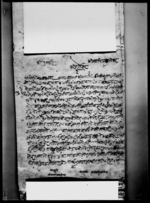A purjī from C-in-C Deva Śamśera ordering Candra Bahādura Sāhī to account for expenditures for feeding meat on the occasion of Baḍādasaĩ (VS 1957)
ID: K_0608_0055
Edited and
translated by Astrid Zotter
Created: 2018-10-25;
Last modified: 2019-08-08
For the metadata of the document, click here
The accompanying edition, translation/synopsis and/or commentary are available under the terms of the Creative Commons Attribution-ShareAlike 4.0 International License
Abstract
This purjī from Commander-in-Chief General Deva Śamśera directs the secretary (kharidāra) of the Gūṭhī Kharca Aḍḍā, Candra Bahādura Sāhī, to record sums spent on purchasing four sheep together with spices with which feed to feed the poor on the occasion of the Baḍādasaĩ festival. It refers to an authorization (pramāṅgī) previously issued to exceptionally sanction this purchase.Diplomatic edition
[1r]
1श्री२1श्री३सर्कार2१1श्रीपुर्णेश्वर
2३1श्रीजगनंदप्रकासेश्वर
2४1⟪नंवरये़काईस्
2२१⟫1स्वस्तिश्री•मद्राजकुमारकुमारात्मज्मजश्रीकम्यांडर•इनचिफजनरलदेवसं
2म्सेरजंगराणावहादुरकस्य•¯ १¯ ¯तर्फगुठीषर्चअडाकाषरीडारचंद्रवहादुरसाही
3केपुर्जीउप्रान्त•हामीगरीप्गुर्व़ा⟪हरु⟫लाईवडादसैमा•मासुषानुलाईसावीक्वक्से
4वमोजीं•षसीषरीदगरीदीनुभंन्याप्रमांगीगरीपाउभनि¯ २¯ ¯काकानाषोरंडाह
5रुले¯ ३¯ ¯काहजुरमावींतीचढाउदा•मोहरु२५पचीस्लेठुलाठुलाभेडा
6कीनीष्वाउनुभंन्यामर्जीभय़ाकोछभनि•प्रमांगीकप्तां•नारांवहादुरमह
7त्छेतृले•५७सालआश्वीनसुदी६रोज१मास्हीछाप्गरेकोहुनालेप्रमां
8गीवमोजीं•ठुलोभेडा४केदर१केमोरु५||•लेमोरु२२रमसलामो
9रु३ज्मामोरुपचीच्२५षर्चभैसक्योसोषर्चभय़ाकोमोरु
10२५सावीक्वमोजीं¯ ¯ ¯कास्याहामाषर्चलेषी•सनदगरीपाउभनि
11गुठीवंदोवस्तअडामार्फत्•षरीदारचंद्रवहादुरसाहीलेहाम्राहजुरमावी
12न्तीपार्दाजाहेरभयोतसर्थ•प्रमांगीवमोजीं¯ ¯ ¯कागरीप्गुर्वाहरुला
13ई⟪वडादसैमा⟫मासुष्वाउनाकेषरिदभै⟪गय़ा⟫कोभेडा४केमोल्मोरु२२रमसलाकोवापत्•
14मोरु३ज्मामोरु२५¯ ¯४ ¯कास्याहामाऐन्सव़ाल्वमोजींषर्चलेषी•
15दिनुवहीवुझदामोजराहोला१९५७सालआश्वीन•सुदी१५रोज२शु¯¯¯
Translation
[1r]
Śrī 3 Sarkāra – 1
Śrī Purṇeśvara – 3
Śrī Jaṅgānandaprakāśeśvara (text: Jaganaṃdaprakāseśvara) – 4
Number twenty-one, 211
Hail! A purjī of the venerable Commander-in-Chief General Deva Saṃsera Jaṅga Rāṇā Bahādura, a venerable prince born of a prince, to Caṃdra Bahādura Sāhī, the secretary (kharidāra) of the Guṭhī Kharca Aḍḍā under [Śrī 3 Sarkāra]2 .
Uprānta: When the handicapped (lit. "one-eyed and lame") of -2-3 submitted a petition to -3-4 stating: "May an authorization letter (pramāṅgī) be issued concerning [an exception to the usual order,] which states 'Buy gelded goats in order for us poor [to be able] to eat meat during Baḍādasaĩ, in accord with what has usually been done'," a pramāṅgī was signed and sealed by Captain Nārāṃ Bahādura Mahat Chetṛ in the [Vikrama era] year [19]57, on Sunday, the 6th of the bright fortnight of Āśvina, stating that an order had been given for very big sheep to be bought with 25 mo[hara]ru[paiyā̃]s. Whence, in accordance with the pramāṅgī, a total of 25, [in words] twenty-five, morus has already been spent, 22 morus [for] 4 big sheep, at the rate of 5 rupees, 2 sukās for 1 head, and 3 morus [for] spices. [All this] came to our notice when Kharidāra Caṃdra Bahādura Sāhī—having as usual recorded these 25 morus spent in the account book (syāhā) of the ...5 —filed a petition through the Guṭhī Bandobasta Aḍḍā, stating: "May a [corresponding] sanada kindly be issued." Therefore, in accordance with the law (ain) and administrative instructions (savāla), write down in the account book (syāhā) of the [Śrī Jaṅgānandaprakāśeśvara]6 [guṭhī] the expenditures totalling 25 morus: 22 morus as the price for 4 sheep and 3 morus for spices that were bought to feed meat during the Baḍādasaĩ to the poor of ...7 It will be deducted when the accounts are checked (bāhi bujhadā).
Monday, the 15th of the bright lunar fortnight of Āśvina in the [Vikrama] era year 1957 (1900 CE). Auspiciousness.
Commentary
The document concerns the feeding of meat to the poor during the autumnal Dasaĩ. From similar documents issued to the same effect in previous and subsequent years (K_0614_0041 issued in VS 1955, K_0660_0052 in VS 1960, K_0664_0017 in VS 1961 etc.) it is apparent that it pertains to persons being fed at the Pūrṇeśvara Pākāśālā, which fell under the purview of the Jaṅgānandaprakāśeśvara Guṭhī, though the two institutions are only referred to in the present document under the names of their titular deities. As remarked in the notes above, the pairing of the honorific references at the beginning of the document with the numbered (or unnumbered) blank spaces in the text is not completely clear. There may have been some confusion when the document was scribed (or copied).
This order to record expenditures for a festive meal differs from similar documents extant for other years in that, exceptionally, sheep (bheḍā) instead of gelded goats (khasī) had been bought. Accordingly, it refers to a different and longer administrative process, with much paperwork having to be filed in connection with a pramāṅgī (special authorization that had to be issued to circumvent the existing practice). From the references to other paperwork throughout the document, it appears that 1) the persons who were fed at the kitchen filed a petition (bintī) to the government requesting such exceptional permission. That permission was 2) issued by Captain Nārāṃ Bahādura Mahat Chetṛ from an unidentified office. As this pramāṅgī refers to 3) an order (marjī) having been given, the captain probably 4) was directed to issue such an order by a higher office. The purchase was made, and probably on account of of its exceptional nature, the amount sanctioned was 25 rupees, a sum that was 2 rupees short of the expenses incurred in other years, 5) the responsible accountant (kharidāra) of the Guṭhī Kharca Aḍḍā requested a sanctioning order by the government (sanada) to reconfirm the unusual process. The present purjī is this sanada, and at least the sixth document concerning this case, having been issued in the name of the commander-in-chief general, the second highest post in the Rāṇā era government.

